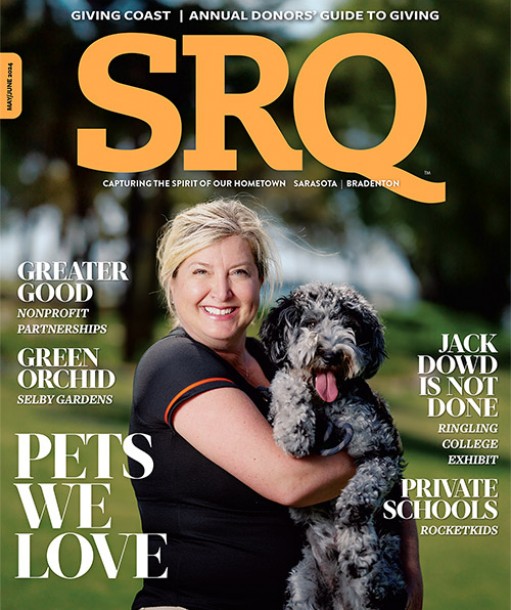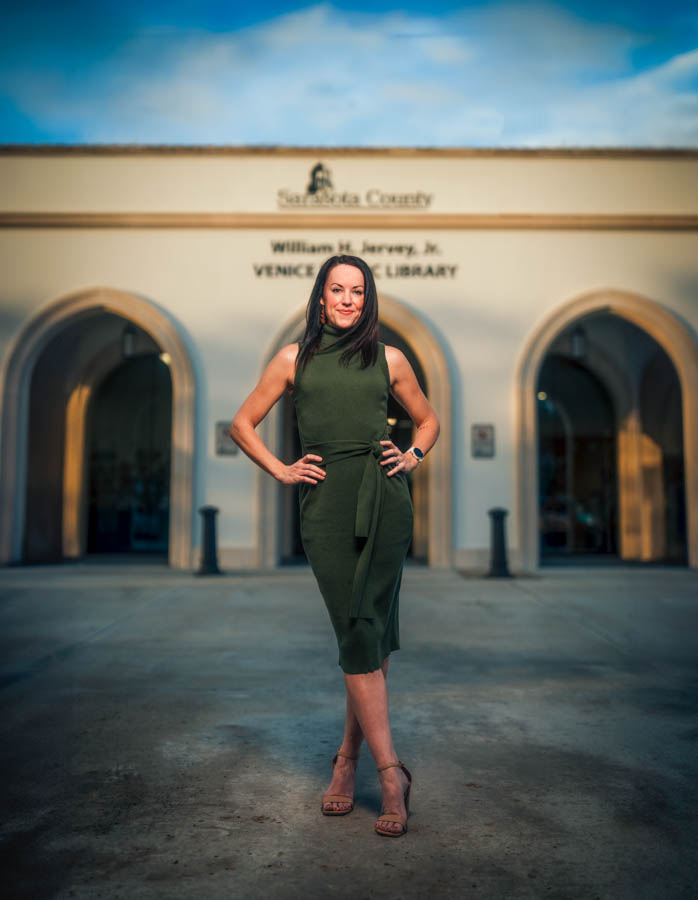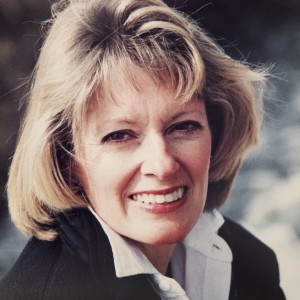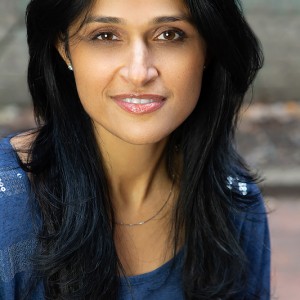The Sarasota County Library hosted its inaugural Off the Page Literary Celebration this past November. Over the course of two weeks, writers and illustrators from all genres descended upon Sarasota, sharing their passion with local readers. We caught up with Sarah Penner, the St. Petersburg-based New York Times bestselling author of The Lost Apothecary and The London Séance Society, to hear about her journey from working in corporate finance to becoming a full-time writer. We learned about her process and sources of inspiration and her advice for those hoping to follow in her footsteps.
At what point in your life did you know or decide that you were interested in being a writer, and what inspired you? SARAH PENNER: As a child, I loved writing. I kept journals and diaries of various sorts, and I distinctly remember going to Borders bookstore (millennials and above know what that was). I remember, I used to walk up to the tables at the front and marvel at these beautiful, brand-new books. They smelled good, they were shiny, and I thought to myself, “How amazing would it be to have my name on one of these books?” That dream was established when I was a lot younger, but then I went to school for finance. I’m an analytical, numbers-oriented person. After I was working in the corporate workforce, I started to find myself creatively unfulfilled; this was in my late 20s. I’m an introspective person, and I love change and growth, so I decided, if I’m feeling unfulfilled, I’m going to revisit some of my childhood interests, and one of those was writing. I think a lot of us, when we were children, that’s when we were most free or creative, so a lot of our deep passions existed at that time (but then we lose them in adulthood because we’re busy with bills and stress). So, I decided to enroll in an online creative writing class. I took several of them, absolutely loved them, and decided I was going to start writing more seriously and try my hand at writing a novel-length project.
Can you share your journey from working for 13 years in the corporate finance world to becoming a New York Times bestselling author? PENNER: After I made my first attempt at writing a novel, I sent it out to over 130 literary agents, the gatekeepers into the publishing industry. I received rejections from all of these agents, and a couple of them gave me some advice, which was that the women characters in my story needed more agency. Things were happening to them, but they weren’t the heroes of their own stories. During my corporate years, I would wake up at 5 am every day to write, and I would write until I had to go to work. I sat down to try writing a second book, and I made a point from the outlining and idea-generating stage that this needed to be a book about women with agency. That book became The Lost Apothecary.
I sent The Lost Apothecary to 12 agents, and five of them offered representation. It was a vastly different experience from my 130 rejections. I signed with an agent, and we worked on manuscript revisions for a few months. She sent it to HarperCollins and they bought it overnight. It was an instant New York Times bestseller, and it has been published in over 40 languages. I have a second New York Times bestseller out and two more books under contract, and I quit my day job in 2021. I’ve now been writing full-time for almost three years. My life took this different trajectory from finance to writing (I can’t think of two things that are more dissimilar), but here we are, and I’m loving almost every day of it.
I’m a big believer in constructive criticism. I don’t take things personally and I believe in the concept of “fail fast,” which means if you have something you want to achieve, you’re going to make repeated attempts to make it happen and most are going to fail. That’s okay, that’s actually good, because that’s how you’re getting to the better product, but you need to be quick about it. You can’t sit there and shed tears for months on end if something you do isn’t working. So, as soon as I was getting this feedback on that first manuscript, I went back to the drawing board and came up with my second idea.
How did you get your inspiration for The Lost Apothecary and The London Séance Society? PENNER: Both books are set in London. London is my favorite city in the world. From the first moment I set foot there, I felt inspired and energized, so when I wrote The Lost Apothecary, I knew I wanted it to be set in London. I’ve also always liked apothecary-ish things. I’m big into herbal teas and cooking, I’ve dabbled in gardening, and I love candles and herbs. So, all of these things that an apothecary would deal with in a shop, I have a personal interest in. Readers love poison, I love researching poison, and I thought, “How cool would it be if this apothecary sold poison to women and had this secret whisper network?” I noticed, throughout my travels around the world, that a lot of “apothecary” retail shops were opening up in big cities, and they sell toiletries or candles or what have you. I just felt like it was kind of becoming trendy, but if you go to Barnes & Noble and look for a book about an apothecary, there’s not much out there. It was a confluence of my personal interest and what I felt was trendy.
With The London Séance Society, I always wanted to write a ghost story, but I wanted to avoid the haunted house trope that we see so often in paranormal fiction, so I decided to take the séance approach. Similar to the apothecary in my first book, I wanted to write about a medium or a spiritualist who was best-in-class, highly respected and an expert. I was able to do that with my main character and, ultimately, she and her apprentice end up exposing this fraudulent gentlemen’s society. With all of my books, I aim to give the reader lots of twists and cliffhangers. My books all have a feminist bent. I love atmosphere and a sense of place; I often settle on the location before I even know anything about the characters. I like to visualize things cinematically in a way that would make them adaptable to the screen.
How do you get your character inspiration and turn that into someone who lives on the page? PENNER: None of the characters in my books are real-life characters. My writing is not what you would call biographical historical fiction. However, the two main characters (the apothecary in my first book and the medium in my second) are representative of the types of people in that profession, based on information that I’ve learned through my research.
For Vaudeline, the medium in my second book, what I learned when I was researching the spiritualist movement in Victorian London was that women were more highly respected as mediums than men because they were considered more amenable to allowing a spirit to take control of their psyche. I purposely built this character as representative of what I was covering through my research about women. They would garner huge audiences and put on elaborate shows for which they charged exorbitant ticket prices. They were adored, loved and respected by their fans and their crowds. I made Vaudeline mysterious and seductive, and that was a personal preference. I like writing about enigmatic women in my stories.
What does your research process look like? PENNER: I take a top-down approach, meaning that, before I start drafting, I spend a few months researching the setting, profession or subject matter. I call that taking a 30,000-foot view, and I’ll read really broad-stroke non-fiction, go to museums, immerse myself however I can and take classes to teach myself about the topic. Once I have foundational knowledge and I feel like I can start writing actual scenes without looking like I’m totally ignorant about what I’m talking about, then I’ll go draft the book. It’s a raw, rough draft, and I use brackets in the story to indicate open research gaps that I need to revisit later. After I have the story drafted, as I’m going through revisions, I’ll follow up on those research gaps. A perfect example is my third book that I’m working on right now. My present-day character is a nautical archeologist, and I didn’t know anything about nautical archeology. I didn’t know how shipwrecks are excavated. I’m a scuba diver, but that’s about the extent of it. I took two different courses on maritime archeology, I have countless books about it on my bookshelf, and I scoured the internet for information on specific shipwrecks and how archeologists treat them and safely excavate them. I informed myself, and that allowed me to build that character more realistically.
Why do you love London so much as a setting? PENNER: I find London really interesting because it’s this juxtaposition of new and old. You can be walking down a street and walk into a brand-new, trendy sushi restaurant, but right next door will be a brick alleyway with a placard that says “The pub behind the alleyway is 400 years old.” You can walk into that pub, and there are these old wooden floors beneath you and a hearth or fireplace that’s covered in soot and ash. This balance of new and old keeps things really interesting for me. I feel like the city is bustling and vibrant, but there are so many historical nooks and crannies to explore.
What can you share about the next book? PENNER: My third book is set on the Amalfi coastline in Italy, specifically the Positano area. Most people don’t realize that Positano was a tiny, quaint fishing village in the 1800s; now it’s one of the most touristy places in the world. It’s about a present-day nautical archeologist and advanced scuba diver who is investigating a cluster of mysterious shipwrecks off the coast of Positano. She suspects that they may be related to a coven of sea witches who lived 200 years earlier and possibly have returned to the area.
What advice do you have for writers? PENNER: The first piece of advice, for writers who are aspiring to traditional publication, is to make sure that you don’t just love the idea of being published, but that you love the exercise of writing and revising. On my social media, which is very curated, I show images of myself writing at a coffee shop with a beautiful latte next to me, and I show myself traveling to festivals in cool cities, meeting with big authors and getting advanced reader copies of books. All the fun stuff. What I don’t show are those hours sitting at my computer, tearing up one chapter over and over, to the point that I’m about to pull my hair out. I think a lot of people who want to write romanticize what it is based on what they see authors putting out there, which are book tours and coffee shop writing sessions. The reality is that that’s just a fraction of writing. Make sure you enjoy that revision process because that’s mostly what you’re doing.
Writing can be a very lonely profession, so finding your community early is my second piece of advice. Long before I was agented, I started going to different writing workshops and a conference through the Historical Novel Society, where I met some amazing fellow writers, some of whom have had careers that have run parallel to mine. We’ve gotten agented and published around the same time, and they have been wonderful resources for me to bounce ideas off of, to commiserate with and to celebrate with. That community may be virtual, whether it’s Reddit forums, social media or whatever it is. There are a lot of opportunities for writers to connect.










